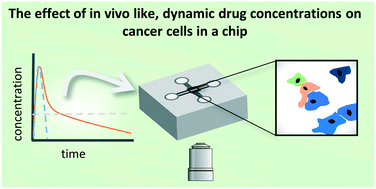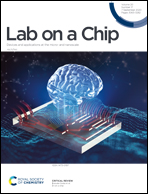Controlled pharmacokinetic anti-cancer drug concentration profiles lead to growth inhibition of colorectal cancer cells in a microfluidic device†
Abstract
We present a microfluidic device to expose cancer cells to a dynamic, in vivo-like concentration profile of a drug, and quantify efficacy on-chip. About 30% of cancer patients receive drug therapy. In conventional cell culture experiments drug efficacy is tested under static concentrations, e.g. 1 μM for 48 hours, whereas in vivo, drug concentration follows a pharmacokinetic profile with an initial peak and a decline over time. With the rise of microfluidic cell culture models, including organs-on-chips, there are opportunities to more realistically mimic in vivo-like concentrations. Our microfluidic device contains a cell culture chamber and a drug-dosing channel separated by a transparent membrane, to allow for shear stress-free drug exposure and label-free growth quantification. Dynamic drug concentration profiles in the cell culture chamber were controlled by continuously flowing controlled concentrations of drug in the dosing channel. The control over drug concentrations in the cell culture chambers was validated with fluorescence experiments and numerical simulations. Exposure of HCT116 colorectal cancer cells to static concentrations of the clinically used drug oxaliplatin resulted in a sensible dose-effect curve. Dynamic, in vivo-like drug exposure also led to statistically significant lower growth compared to untreated control. Continuous exposure to the average concentration of the in vivo-like exposure seems more effective than exposure to the peak concentration (Cmax) only. We expect that our microfluidic system will improve efficacy prediction of in vitro models, including organs-on-chips, and may lead to future clinical optimization of drug administration schedules.



 Please wait while we load your content...
Please wait while we load your content...